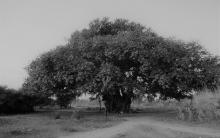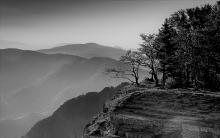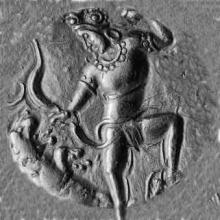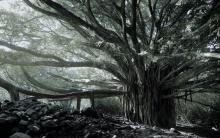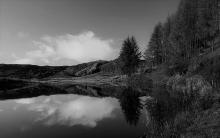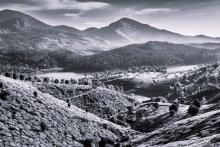Author:hari
Kṣemendra
Kṣemendra was a man of many talents who straddled the realms of śāstra and kāvya. Although he composed several works in both these genres, his attainments as a poet outshine his scholarly contribution. Kṣemendra’s thoughts on literary aesthetics embedded in poetic works, though not pathbreaking, have an intrinsic value as the utterances of a prolific author. Let us examine some.
The poet communicates his aesthetic intent at the beginning of the satirical work Deśopadeśa:
[We take great pleasure in commencing a series on Alaṅkāra-sudhānidhi, a Sanskrit treatise on Poetics authored by Sāyaṇācārya. The text is critically edited for the first time by Śatāvadhānī Dr. R Ganesh and Shashi Kiran B N, and will be published by the Oriental Research Institute, Mysuru. This series constitutes a major portion of the editors’ introduction to Alaṅkāra-sudhānidhi. We thank Dr. D P Madhusudan Acharya, the Director of Oriental Research Institute, for permitting us to publish the introduction. —Ed.]
Continued from the previous part ...
Virāṭa, Uttara, Pāṇḍavas and Abhimanyu constitute the third group of people. It is almost impossible to undertake an exclusive study of their characters, values, and the episodes associated with them; their nature and character are closely knit with each others. Abhimanyu’s character is noteworthy and here is a small extract from the drama.
जब नाग वंश के लोग अत्यंत शक्ति शाली हो गये थे तथा सनातन धर्म के लिए संकट उपस्थित कर रहे थे तो समुद्रगुप्त ने उन्हे ठण्ड़ा कर सौम्य प्रत्यायन द्वारा प्रभावित करते हुए उन्हे सनातन धर्म के महत्त्व को समझाया जिसके फलस्वरुप नागर ब्राह्मणों का उदय हुआ।
‘ಜಲಪಾತ’ದಲ್ಲಿ ಸಹ್ಯಾದ್ರಿಶ್ರೇಣಿಯ ಖಂಡಾಲಘಾಟ್ನ ಭವ್ಯವಾದ ವರ್ಣನೆಯಿದೆ. ಸೃಷ್ಟಿಶೀಲತೆಯ ಬಹುಸೂಕ್ಷ್ಮ ಆಯಾಮಗಳನ್ನು ಕಲೆ, ಪ್ರಕೃತಿ, ಸಂಸ್ಕೃತಿ, ಮಾನವಜೀವನವೇ ಮುಂತಾದ ಮಾಧ್ಯಮಗಳ ಮೂಲಕ ಚಿತ್ರಿಸುವ ಈ ಕಾದಂಬರಿ ಕಾವ್ಯಾತ್ಮಕತೆಯಿಂದ ವಿಶಿಷ್ಟವಾಗಿದೆ. ಶ್ರೀಪತಿ-ವಸುಂಧರೆಯರ ಬಲವದ್ ಬ್ರಹ್ಮಚರ್ಯೆ ಮುಗಿದು ಮಿಲನ ಸಫಲವಾದ ಬಳಿಕ “ಇನ್ನು ಮೇಲೆ ನಿನ್ನನ್ನು ದಿನಾ ಭೂದೇವಿ ಅಂತೀನಿ” ಎಂದು ಶ್ರೀಪತಿ ಹೇಳುತ್ತಾನೆ (ಪು. ೧೦೩). ಭೂದೇವಿ ಎಂಬುದು ವಸುಂಧರೆಗೆ ಚಿಕ್ಕ ವಯಸ್ಸಿನಿಂದ ರೂಢವಾಗಿದ್ದ ಮುದ್ದಿನ ಹೆಸರು. ಅದು ಶ್ರೀಪತಿಗೆ ನೆನಪಾದ ಸಂದರ್ಭ ಮಾರ್ಮಿಕವಾಗಿದೆ. ಇದರ ತರುಣದಲ್ಲಿಯೇ ಅವರು ‘ವಸುಂಧರೆ’ಯ ಸಂಪತ್ತಿಗಳಲ್ಲೊಂದಾದ ಬೆಟ್ಟವನ್ನು ಕಾಣಲು ಖಂಡಾಲಕ್ಕೆ ತೆರಳುತ್ತಾರೆ.
The play Pañca-rātra does not contain some of the bitter episodes that are present in the original Mahābhārata; for instance, in Bhāsa’s version, Kīcaka does not molest Draupadī and neither does King Virāṭa strike Dharmarāja with his dice; the episode of go-grahaṇa took place not because of the jealousy of Suśarmā and Duryodhana but because of Bhīṣma who wanted a peaceful resolution for the dispute between the brothers.

